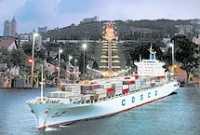Mr. Gad Sheffer Chairman of the Israeli Shippers' Council slammed last week the shipping companies arguing that due to the recent service improvement at the port of Ashdod, there was no justification to charge 7% congestion surcharge.
Shefer noted that since the ports reform, which came into effect last February, the port of Ashdod, under it's new management, increased productivity and shortened ships turnaround time.
Sheffer emphasized that the council was co-operating with the port management to convince shipping companies to do away with the surcharge.
Together with the port management, Sheffer had met several shipping companies and said that "the council expects the shipping companies to be fair to the shipping public and justify the surcharge." Sheffer noted that "the fact that in the last few months ships do not have to wait, shows that the surcharge should not be applied."
Mrs. Iris Shtark, chair of the recently established Ashdod Port company, said that the new port facility had dramatically reduced ships waiting time by 70%. She emphasized that another 100 workers were added to the work force bringing the total number of employees to 1,300. According to Shtark port users should already experience the service improvement in all port services.
The port published last week statistical data showing that during the first six months ships operational waiting time, for all ships calling at the port, was reduced by 77%. Containerships experienced, between March and July 2005, waiting time reduction of 76%. In addition there was a 20% increase in TEU movement, a 9% increase in general cargo moving through the port and 20% increase in bulk cargo.





